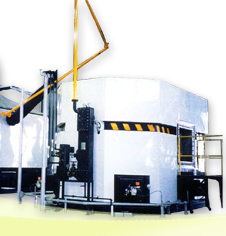 waste Oil Recycling waste Oil Recycling |
| |
 Waste Engine Oil Waste Engine Oil |
| |
|
In order to prevent wear and tear of component parts, most vehicles, Ships, power-pack machinery, agricultural or industrial engines, compressors and other industrial machines need lubricating oil( Lubrication oil) also called "Engine Oils". They are used to lubricate parts of machinery. Over a period of time this oil becomes contaminated and leads to the degradation of the lubricating oil. At this point, the oil must be changed, so that the machinery will not be damaged. This oil then becomes known as "Waste Engine Oil" or "Waste lubricating oil." Consider motor vehicles for example, it is necessary to change lubricating oil frequently to protect the engine. This may be at intervals of up to 10,000 kilometers, depending upon geographical location. A motor vehicle may well cover 1,000,000 kilometers during the lifetime of the engine. In this case, the lubricating oil would have to be changed 100 times. If one car has an engine oil capacity of 3.5 litres of lubricating oil, it will create 350 litres of waste engine oil. The average use in any one year can be estimated at 40,000 kilometers. Therefore it can assumed that each car will need four changes of engine oil every year producing up to 14 liters of waste engine oil. This has to be put into context with other sources of waste engine/lubricating oil, produced by other vehicles such as motor buses, freight trains, motorbikes, airplanes, fishing boats, steamers, railway and industrial machines, as previously mentioned. The total amount of waste engine oil is enormous. If the oil is not dealt with carefully, it is easy to envisage its polluting impact on the environment. |
| |
|
|
| |
 Waste Hydraulic Oil Waste Hydraulic Oil |
| |
|
Since the last quarter of the 20th century, air compressors and hydraulic machines have been widely used in field applications and industrial operations due to convenience and ease of operation. The essential energy media of hydraulic machinery is hydraulic oil. During operation, hydraulic oil works at high pressure and will produce thrust of high pressure to drive high oil pressure components such as hydraulic motors, hydraulic rams, etc. Contamination of the hydraulic oil occurs, such as grit and dust. It also tends oxidize at high speed. The hydraulic oil might also be polluted by friction damage caused by rubbing against other components and causing loss of oil from pipelines. Periodically, the oil needs to be changed with fresh hydraulic oil. This may be carried out at regular intervals during maintenance. This is one of the sources of waste hydraulic oil as compared to waste engine oil. In consequence, the amount of waste hydraulic oil is immense. |
| |
|
| |
 Cutting Oil, Industrial Lubricating Oil and other kinds of Waste Oil Cutting Oil, Industrial Lubricating Oil and other kinds of Waste Oil |
| |
|
The volume of this range of waste oil is huge. It is easy to consider why. The additional potential value is extremely high. So is the potential environmental pollution, unless they are dealt with in an efficient and cost effective manner. Cutting oil from engineering and tool making industries, insulating oil used in high voltage transformers, grease oils, from steel mills and other facilities which use conveyors and polluted fuel oil, etc all contribute to considerable amount of waste oil produced on a day to day basis. In is true to say, that any oil produced which is not used as a fuel oil, is a potential used (waste oil) posing a direct and serious threat to the environment. The composition of waste oil can be complicated and must be dealt with individually before regeneration or recycling.. The cost of handling all of these combinations of oils with differing component structures together is not feasible. The segregation of the different types of waste oils is very important. Hence the technology for dealing with these various types of waste oils should be considered separately. Our re-refining and regenerating technology deals with just some of these waste oils. In doing so, the ACT – Diesel technology can refine and regenerate the waste engine oils to a very good and acceptable quality, with no contaminants released to the environment which could cause damage. By being selective, this technology can be applied with confidence and in the knowledge that it will not cause any environmental damage whatsoever. |
| |
|
| |
 Economic Benefits from Recyling Economic Benefits from Recyling |
| |
|
Main ingredients of waste engine oil are hydrocarbon, heavy metals, acid, chemical additives, sludge, and other organic or inorganic impure materials which are harmful to animals and plants. If these materials are removed during a re-refining operation using up to date technology they will be controlled safely. This will result in considerable economic benefits from recycling of waste engine oil, as well as providing environmental protection. |
| |
|
|
|
|









